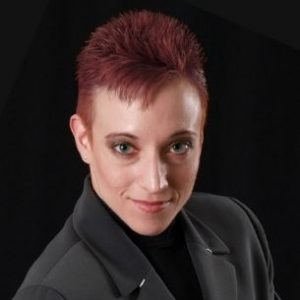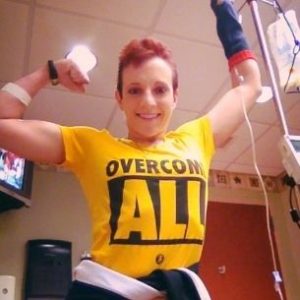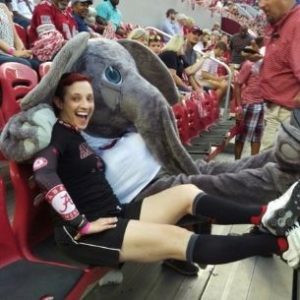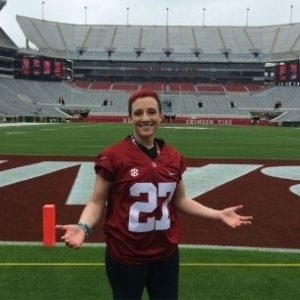 Throughout her childhood, Kristen Yukness had two primary interests for her career: medicine and law enforcement. After high school, she pursued law enforcement and earned bachelor’s and master’s degrees in Accountancy — graduating magna cum laude and with a 4.0 GPA respectively. After passing the necessary exams, she began working as a federal law enforcement officer and has had a highly decorated career as an agent, supervisor, instructor and trainer.
Throughout her childhood, Kristen Yukness had two primary interests for her career: medicine and law enforcement. After high school, she pursued law enforcement and earned bachelor’s and master’s degrees in Accountancy — graduating magna cum laude and with a 4.0 GPA respectively. After passing the necessary exams, she began working as a federal law enforcement officer and has had a highly decorated career as an agent, supervisor, instructor and trainer.
As distinguished and awarded as her time in law enforcement has been, that dream of being a doctor never quite passed, and her experiences kept giving it new life.
While she was finishing college and beginning her career, Kristen was also caring for her father as he fought an aggressive cancer. In 2001, he passed away. “Dad always said, ‘You die when you stop learning,’” Kristen said. By 2004, she had earned her second master’s, in Criminal Justice, through online coursework while working full time. “My parents always hoped I’d go into medicine. Even though my Criminal Justice degree may seem unrelated, you can see the bend toward physical fitness and the human body in my thesis,” Kristen said.
In 2010, life dealt her another blow when the same disease that stole her dad also took her mom. Eleven months after she buried her mom from cancer, it was back for her. As an only child, Kristen was on her own for the fight of her life.
“I know what it’s like to feel like you’re in the middle of a forest with no one else around — and the forest is on fire. In total, I went through over 30 hours of surgery plus chemo and radiation treatments. All you can do is put one foot in front of the other. Every day you wake up is a day you can choose to wallow or use it for a purpose.”
While undergoing treatment, even though she’d been told she would not survive, Kristen used her time in the hospital for a purpose. “Being in the middle of that as a patient and having been a caregiver twice, and having an interest in medicine already, I realized that we need more doctors who have been patients. It can help that patient-physician trust bond develop, and it can lead to better care.”
She researched and found that adults are entering medical school at older ages and doing quite well. She picked up the pre-med coursework she had begun in undergrad and finished the requirements. Like every other academic program she has completed, she finished it with a 4.0 GPA. “When you put your mind to something, you do it,” she said. “You believe in yourself even if others don’t. When you’re facing your own mortality and fighting for your life, you have to steel yourself to get back up when you fall, and then keep going.”
During this time, she found an unlikely escape in The University of Alabama. She was living in Georgia, but with most of her time spent in the hospital for nearly two and a half years, she would leave to spend her weekends in Tuscaloosa visiting friends on and around the campus. “I met more people and developed more friends; it became a home away from home for me,” she said.
 After she completed her treatments, her law enforcement career relocated her to Minnesota where she began looking for opportunities to strengthen her research background. “I was doing research with a mentor, but I wanted to be able to publish and hone those skills, not just to make myself a more qualified candidate for med school, but also to be more well-rounded for my future patients as well.” From her UA friends, she heard that UA’s medical school arm, the College of Community Health Sciences (CCHS), was launching an online master’s program in Population Health Sciences, and she was intrigued. With a few years left before she could retire from law enforcement and pursue medical school, it seemed like a perfect opportunity to invest in her future.
After she completed her treatments, her law enforcement career relocated her to Minnesota where she began looking for opportunities to strengthen her research background. “I was doing research with a mentor, but I wanted to be able to publish and hone those skills, not just to make myself a more qualified candidate for med school, but also to be more well-rounded for my future patients as well.” From her UA friends, she heard that UA’s medical school arm, the College of Community Health Sciences (CCHS), was launching an online master’s program in Population Health Sciences, and she was intrigued. With a few years left before she could retire from law enforcement and pursue medical school, it seemed like a perfect opportunity to invest in her future.
She began the program in Spring 2019, but that summer she took some time off due to financial constraints. “School can be expensive, and with cancer-related medical bills, it can certainly be extraordinarily difficult to get back on one’s feet.” In 2020, she resumed the program full time with a research fellowship from CCHS and UA’s Center for Community-Based Partnerships. She’s been able to assist with research remotely. In turn, the fellowship has covered her tuition and given her a stipend that has helped her pay for necessities, including some of those medical bills.
“I will always be grateful that CCHS took a chance on me. They took a chance that a distance student could do it. It’s been life altering, the fellowship experience,” she said. “We look at health disparities across the board, choose an area of focus, and work to develop that into a publishable work that helps the school and department advance in research. I have two amazing mentors, Drs. Mercedes Morales-Aleman and Randi Henderson-Mitchell. They’ve believed in me and supported me.”
Kristen participated in UA’s Annual Research and Scholarly Activity Day in 2020, where she won first place in the student division for her fellowship work on Demystifying Rural Southern U.S. Breast Cancer Radiation Treatment Interruption. “I’m grateful for the opportunity to prove myself and to spotlight the great research we’re doing and what a strong research school UA is,” Kristen said.

The fellowship alongside a demanding law enforcement career of 10- to 12-hour workdays and a full-time graduate course load of online classes keeps Kristen busy, but she chooses gratitude over defeat. “It’s a matter of perspective, isn’t it? The program, the fellowship — even each little assignment and activity of the program — I don’t view these as things I have to do. They’re things I get to do,” she said. “We all have goals. The path to them is built through the everyday grind and a long process of development.”
Kristen is on track to graduate in December 2021 and plans to apply to attend medical school at UAB as soon as she is able. She hopes to use her master’s from UA along with her UAB medical degree to focus on closing the disparity gap for rural patients as a radiation oncologist.
“You can let a cancer diagnosis define you or you can take it and define yourself. Now that I’ve made it through that forest on fire, it’s incumbent upon me to go back in with buckets of water and a guiding light and start pulling others through, as well.”
Published: March 10th, 2021

